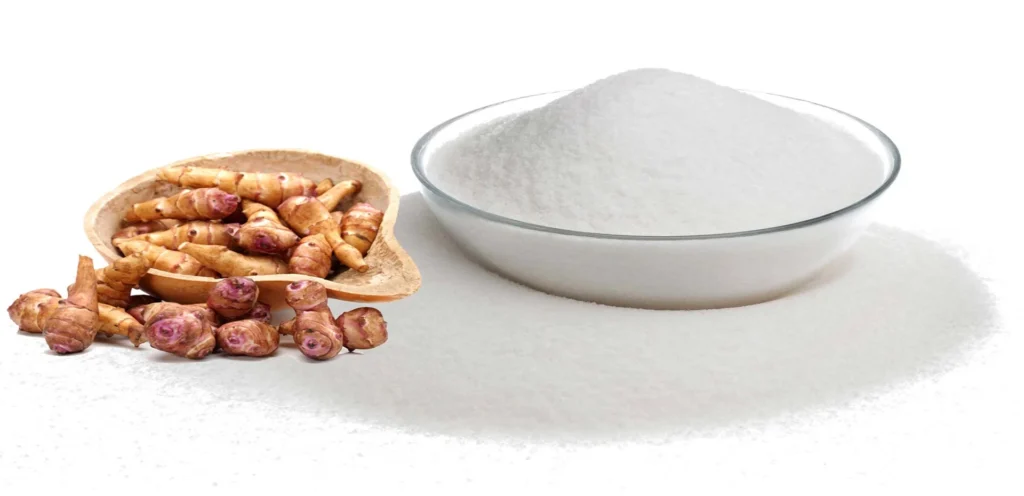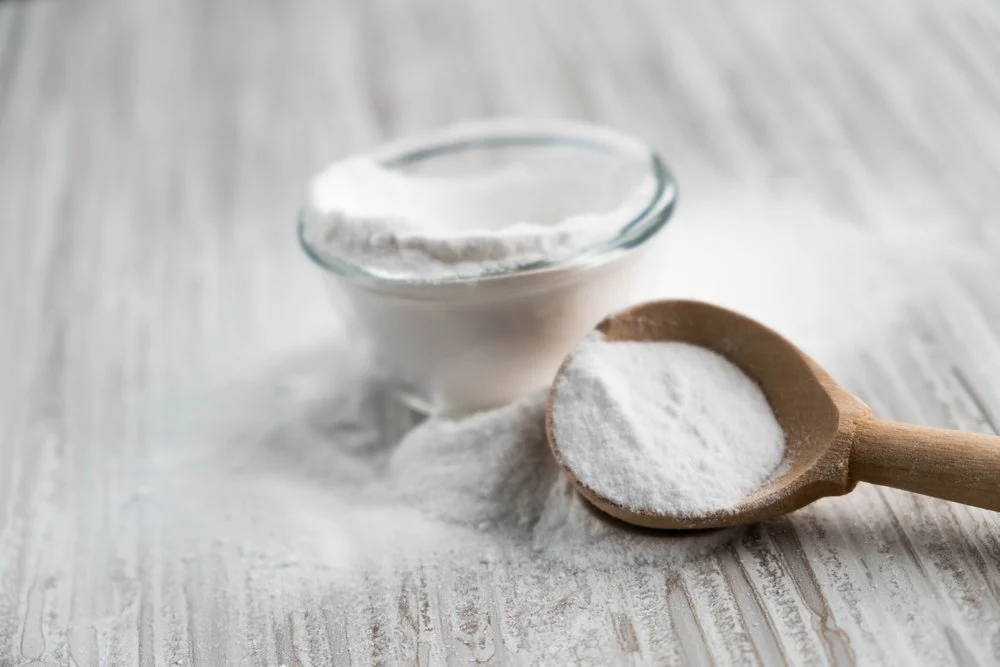In the ever-expanding world of wellness, gut health has taken center stage—and for good reason. A happy gut is linked to better digestion, a stronger immune system, and even a brighter mood. Amidst the buzz, one supplement has quietly emerged as a powerhouse for nurturing our internal ecosystem: inulin powder.
If you’ve heard the term but aren’t quite sure what it is, you’re not alone. Is it a fiber? A sweetener? Something else entirely?
The simple answer is: all of the above. Inulin is a versatile, plant-based prebiotic that can revolutionize your gut health, support your wellness goals, and seamlessly fit into your daily routine. In this guide, we’ll break down everything you need to know about inulin powder, from its science-backed benefits to how to use it safely and effectively.
What Exactly Is Inulin Powder?
Let’s start with the basics. Understanding what inulin is and how it works is the first step to harnessing its power.
A Simple Definition for Beginners
At its core, inulin is a type of soluble fiber found in many plants. As a “fructan,” it’s composed of a chain of fructose molecules. Because your body can’t digest these chains, inulin travels intact through your small intestine to your colon (large intestine). There, it works its magic.
Where Does Inulin Come From?
While inulin is present in over 36,000 species of plants, the most common source for commercial inulin powder is the chicory root. You might recognize chicory as a coffee additive, but its root is packed with this beneficial fiber. Other rich sources include:
- Jerusalem artichokes
- Garlic
- Onions
- Leeks
- Asparagus
- Bananas
The powder form simply makes it easy to get a concentrated, convenient dose.
How Inulin Works: Your Gut’s Favorite Food (Prebiotic vs. Probiotic)
This is where inulin truly shines. To understand its role, you need to know the difference between prebiotics and probiotics.
- Probiotics are the “good” live bacteria in your gut that help with digestion and support your immune system. Think of them as the friendly workers in your gut’s factory.
- Prebiotics are the food for those good bacteria. They are non-digestible fibers that feed and fuel your beneficial gut flora, helping them thrive and multiply.
Inulin is a premier prebiotic. When it reaches your colon, it selectively feeds beneficial bacteria like Bifidobacteria and Lactobacilli. A flourishing population of these good microbes is the cornerstone of a healthy gut microbiome.
Top 7 Science-Backed Benefits of Inulin Powder
From digestion to blood sugar control, the benefits of incorporating inulin into your diet are supported by a growing body of scientific research.
1. Supercharges Your Gut Health and Promotes Good Bacteria
This is inulin’s primary role. By feeding your beneficial gut bacteria, it helps them outcompete harmful microbes. This can lead to a more balanced gut microbiome, which is linked to improved overall health, reduced inflammation, and a stronger immune system.
2. Eases Constipation and Improves Digestive Regularity
As a soluble fiber, inulin absorbs water in the colon, forming a gel-like substance that softens stool. This makes bowel movements easier and more regular. Numerous studies have shown that daily inulin intake can increase stool frequency and improve consistency, making it a powerful natural remedy for chronic constipation.
3. Helps Control Blood Sugar Levels
Because it’s a non-digestible fiber, inulin doesn’t raise blood sugar levels, making it an excellent choice for individuals with diabetes or pre-diabetes. Furthermore, it can slow down digestion, which helps prevent sharp spikes in blood sugar after meals. Some research suggests it may even improve insulin sensitivity over time.
4. Supports Weight Management by Promoting Fullness
Inulin can be a valuable tool in your weight management arsenal. As a fiber, it helps you feel fuller for longer, reducing overall calorie intake. By promoting a healthy gut microbiome, it may also influence hormones related to appetite and satiety.
5. Enhances Calcium and Magnesium Absorption for Bone Health
This is a lesser-known but significant benefit. When gut bacteria ferment inulin, they produce short-chain fatty acids (SCFAs). These SCFAs lower the pH in the colon, which in turn increases the body’s ability to absorb essential minerals like calcium and magnesium—both of which are vital for strong, healthy bones.
6. A Keto-Friendly Fiber and Natural Sweetener
For those on a ketogenic or low-carb diet, getting enough fiber can be a challenge. Inulin powder is a perfect solution. It has zero net carbs (since it’s indigestible) and a mildly sweet taste (about 10% the sweetness of sugar), allowing it to be used as a bulk-adding fiber and a subtle sweetener in keto recipes.
7. May Boost Heart Health
While more research is needed, the outlook is promising. By improving gut health and potentially lowering levels of triglycerides and cholesterol, inulin may contribute to better cardiovascular health. Its role in weight and blood sugar management also indirectly supports a healthy heart.
How to Use Inulin Powder: A Practical Guide
Getting started with inulin is simple, but the key is to begin with a small dose and increase it gradually.
Finding Your Perfect Dosage (Start Low, Go Slow!)
Your gut needs time to adapt to the increased fiber. Rushing this process is the primary cause of side effects.
- Week 1: Start with just half a teaspoon (about 2-3 grams) per day.
- Week 2: If you feel good, increase to one full teaspoon (about 5 grams) per day.
- Maintenance: Most studies show benefits in the 5-10 gram range per day. Listen to your body and find the amount that works for you without causing discomfort. Do not exceed the maximum recommended dose on the product label.
The Best Time of Day to Take Inulin
There’s no single “best” time, but consistency is key. Many people prefer to take it in the morning to kick-start their digestion for the day. Mixing it with your morning coffee, tea, or smoothie is an easy way to remember. Others prefer to split their dose between meals.
Simple & Creative Ways to Add Inulin to Your Diet
The beauty of inulin powder is its versatility. It dissolves easily in liquids and has a neutral-to-mildly-sweet taste.
- In Drinks: Stir it into your coffee, tea, or a glass of water. It dissolves almost instantly.
- In Smoothies: Add a teaspoon to your favorite smoothie for a fiber boost.
- Sprinkled Over Food: Sprinkle it on yogurt, oatmeal, cereal, or even soup.
- In Baking: Use it to replace some of the sugar or flour in recipes for cookies, muffins, and bread. It adds moisture and a touch of sweetness while boosting the fiber content.
Potential Side Effects and How to Avoid Them
Most side effects from inulin are mild and directly related to taking too much, too soon.
Common Culprits: Gas, Bloating, and Discomfort
When the bacteria in your gut have a feast on inulin, they produce gas as a byproduct. This is a sign that the prebiotic is working! However, a sudden increase in fiber can lead to temporary bloating, gas, or stomach cramps. This is why the “start low, go slow” approach is so important.
Who Should Be Cautious or Avoid Inulin?
If you have Irritable Bowel Syndrome (IBS) or are sensitive to FODMAPs (Fermentable Oligosaccharides, Disaccharides, Monosaccharides, and Polyols), inulin might trigger your symptoms. Fructans are a key part of the “O” in FODMAP. If you follow a low-FODMAP diet, it’s best to consult with a doctor or registered dietitian before trying inulin.
The Golden Rule: Hydration is Key!
Soluble fiber works by absorbing water. To help it do its job effectively and prevent digestive backup, make sure you are drinking plenty of water throughout the day, especially when you increase your fiber intake.
Inulin vs. Other Fibers: Which Is Right for You?
How does inulin stack up against other popular supplements?
Inulin vs. Psyllium Husk: A Quick Comparison
- Inulin: A soluble, fermentable prebiotic fiber. Its main job is to feed gut bacteria. It’s great for gut health balance and has a mild sweet taste.
- Psyllium Husk: Mostly a soluble, non-fermentable fiber. Its main job is to act as a bulk-forming laxative. It’s extremely effective for regularity but doesn’t have the same prebiotic punch as inulin.
- The Verdict: If your primary goal is to nourish your microbiome, choose inulin. If your main goal is simply adding bulk for regularity, psyllium is a great choice.
Inulin vs. Stevia/Erythritol: As a Natural Sweetener
- Inulin: Only mildly sweet. It’s more of a bulking agent that provides a hint of sweetness, similar to how flour functions in a recipe.
- Stevia/Erythritol: High-intensity sweeteners with zero calories. They are used in very small amounts purely for sweetness.
- The Verdict: Use inulin for its fiber and prebiotic benefits, with sweetness as a small bonus. Use stevia or erythritol when your primary goal is to sweeten something without adding sugar.
Choosing the Best Inulin: Why Organic Matters
Not all inulin powders are created equal. When you’re choosing a supplement for your health, quality is paramount.
What to Look for on the Label
- Purity: Look for a product that is 100% inulin with no added fillers, sugars, or artificial ingredients.
- Source: Chicory root is the most studied and common source.
- Certifications: Look for third-party certifications that guarantee quality and safety.
The Benefits of Choosing an Organic Inulin Powder
Opting for an organic inulin powder provides an extra layer of assurance. A “USDA Organic” seal means the chicory (or other source plant) was grown without the use of prohibited synthetic pesticides and fertilizers. This ensures you are putting the purest, cleanest fuel into your body to nourish your gut.
The Takeaway
Inulin powder is more than just a fiber supplement; it’s a powerful tool for cultivating a thriving internal ecosystem. By nourishing the beneficial bacteria in your gut, it sets off a cascade of positive effects, from smoother digestion and better blood sugar control to enhanced mineral absorption and support for your weight management goals.
By starting with a small dose, listening to your body, and choosing a high-quality organic inulin powder, you can confidently and safely unlock the profound benefits of this remarkable prebiotic.
Frequently Asked Questions (FAQ)
What are the side effects of inulin powder?
The most common side effects are gas, bloating, and abdominal discomfort, which typically occur when you take too much too soon. Start with a small dose (2-3 grams) and increase slowly to allow your gut to adapt.
Does inulin powder make you poop?
Yes, it can help promote regular bowel movements. As a soluble fiber, it softens stool and adds bulk, which can relieve constipation.
How long does it take for inulin powder to work?
For constipation relief, you may notice effects within a day or two. For broader benefits like improved gut microbiome balance, consistent use over several weeks is necessary.
Who should not take inulin?
Individuals with IBS or a known sensitivity to FODMAPs should exercise caution, as inulin is a high-FODMAP fiber and may trigger symptoms. Always consult a doctor if you have a pre-existing digestive condition.
Is it OK to take inulin every day?
Yes, it is safe for most people to take daily, and consistent use is key to reaping its benefits.
What is the best time of day to take inulin?
There is no single best time. Many people add it to their morning coffee or smoothie for convenience. The most important thing is to take it consistently.
Does inulin reduce belly fat?
While no supplement can “spot reduce” fat, inulin can support weight management by promoting feelings of fullness and supporting a healthy gut, which may indirectly contribute to a reduction in overall body fat, including visceral belly fat.



